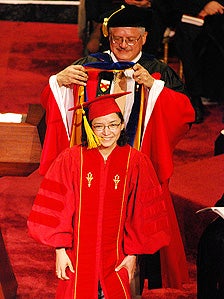On the Tenure Track
Vlad Vicol who earned a Ph.D. in mathematics in 2010 and Rosina Lozano who received a Ph.D. in history in 2011, both in USC Dornsife, have been appointed assistant professors at Princeton University.
Lozano, who came to USC after earning a master’s in education from Harvard University, will serve as an assistant professor of Latino history at Princeton University.
The native of the Bay Area credits the mentorship provided by George Sanchez, vice dean for diversity and strategic initiatives, and professor of American studies and ethnicity, and history, and William Deverell, professor of history, with much of her academic success.
“The main reason I chose USC Dornsife was because of professor Sanchez and professor Deverell who were fantastic,” Lozano said. “They supported me through the entire Ph.D. process with any questions I had. And I know that I can count on them as mentors throughout my career.”
Lozano began seeking advice from Sanchez and Deverell in 2004 as she considered a topic for her dissertation. A former high school teacher, Lozano had a vested interest in the history of bilingual education, but after discussions with Sanchez and Deverell, she realized she was also interested in the politics of national identity.
Her dissertation titled, “Lenguaje sin fronteras (Language Without Borders): The Spanish Language in New Mexico and California Politics, Education, and Identity: 1848-1952,” focused on larger political implications of language at the personal as well as local, state, and national levels. For her research, Lozano pored through archives at several institutions and traveled to various states.
Her work focused on the century following the Mexican-American War when the United States received a large number of Spanish speakers as citizens for the first time. She explored how language connects to the idea of American identity and looks into the ways in which Spanish was retained and rejected in different parts of the American West. She argues Spanish plays a unique role due to its long history in the region and the nation’s proximity to Latin America, which has allowed Spanish to impact public policy, law, and individual lives for generations.
“Rosina’s project really shows the ways in which the Spanish language has not just been a fundamental part of U.S. history, but also a central pivot around which issues of national identity, racial incorporation, and cultural heterogeneity in the United States have been understood,” Sanchez said.
Lozano is committed to telling history to a broad audience in a way that it is accessible to everyone, he said.
“That takes wisdom as a researcher, creativity as a writer and a commitment to teaching,” Sanchez said. “That combination is really striking.”

George Sanchez, vice dean for diversity and strategic initiatives, and professor of American studies and ethnicity, and history in USC Dornsife, places a stole around the neck of Rosina Lozano during her graduation ceremony. Photo by Nick Vossbrink.
Sanchez and Deverell were members of Lozano’s dissertation committee.
“Once you get to the dissertation process you really have to have people who are pushing you in the right direction and allowing you to have both the freedom to become a scholar as well as reigning you in if they think you are going in the wrong direction,” Lozano said. “They both did a fantastic job in allowing me to explore my dissertation topic and also gave me great questions and feedback on my work throughout, which is a big reason why I was able to get such a great job.”
Prior to taking her post at Princeton University, Lozano will spend the 2012-2013 academic year as a visiting scholar at Stanford University and will expand her dissertation into a book proposal with the support of a National Academy of Education/Spencer Postdoctoral Fellowship.
Vicol, whose work focuses on partial differential equations and mathematical fluid dynamics, credits the guidance of Susan Friedlander, professor of mathematics and director of the USC Center for Applied Mathematical Sciences (CAMS), and his adviser Igor Kukavica, professor of mathematics, both in USC Dornsife, with much of his academic success.
“I found my time at USC very stimulating,” he said. “I really appreciated that professors paid attention to students beyond the time in the classroom.”
Vicol, who is currently serving in a post-doctoral position in the mathematics department at The University of Chicago, is still working with Friedlander and Kukavica on mathematical fluid dynamics research.
“Vlad is an excellent teacher and a great mathematician,” Friedlander said. “He is exceptionally quick to understand the material, and can apply his mathematical skills to obtain results.”
A Romania native, Vicol is the recipient of several prestigious honors. He won the USC Theodore Edward Harris Graduate Teaching Prize in 2009, the CAMS Graduate Student Prize for Excellence in Research in 2012, and an American Mathematical Society-Simons Travel Grant for the 2011-2012 academic year.
Upon joining Princeton University in Fall 2012, Vicol plans to carry over the lessons he learned at USC Dornsife.
“As my mentors did, I want to interact with my students beyond the classroom,” Vicol said. “And beyond their time at the university.”